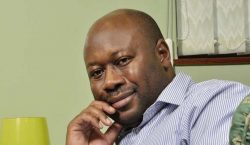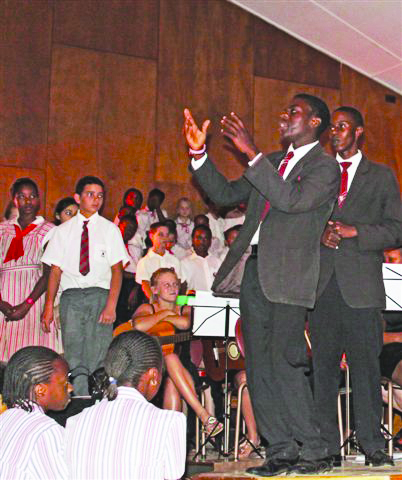


The irony of an occasion marking world peace, set against a background of world conflicts (think Iraqi, Afghanistan) and rumours of war (think Syria), may have been lost on many as the audience revelled in the music.  Globally the International Day of Peace is observed on September 21. It was first celebrated in 1982 and in 2013 the Secretary General dedicated the day to peace education.
Globally the International Day of Peace is observed on September 21. It was first celebrated in 1982 and in 2013 the Secretary General dedicated the day to peace education.
Notwithstanding, the International Day of Peace commemorations were held during the week by Bulawayo schools over two days. Courtesy of two power packed concerts that proved revelatory in terms of the depth of talent exhibited by pupils drawn from across a number of high schools such as Gifford High, Dominican Convent, Girls College, Petra High, Falcon College, Christian Brothers College and primary schools Carmel and Whitestone, local music lovers were treated to an exciting potpourri of sounds from a diverse catalogue of yesteryear pop ditties. The concerts were held at the Zimbabwe Academy of Music in Bulawayo this last week.
Boys from Christian Brothers College did 21 Guns by Nickelback and they sang like pros. Gifford rendered Bob Marley’s One Love. The girls from Dominican Convent offered Ladysmith Black Mambazo/Dolly Parton’s “Peace Train” to thunderous applause. The reason, in my view, was the obvious vocal dexterity of one Ruvimbo Matanhire, a lower six student and daughter of a prominent local lawyer who literally ripped the classic song apart. Later on, I found out that she is coached vocally by Tinashe, a former A-Academy top ten finalist. Other songs such as World In Union, written by Charles Skarbek as a theme song for the 1995 Rugby World Cup was sung by the combined schools choir. The song attempts to epitomise the spirit of international cooperation. Classic Beatles songs such as “Imagine” and “Let It Be” and Bob Dylan’s “Blowing in the Wind” were the other choir pieces.
There were two cringe-worthy moments in the concerts however. FirstIy, it was the Michael Jackson/Lionel Richie monster hit song We are the world. The song has a nice hook but misleading verse about how God has “shown us by turning stones to bread and so we all must lend a helping hand”. God did “no such thing” ! The lyric is based on a false reading of scripture. To set the record straight, in the Matthew chapter four account, Jesus was merely tempted to turn stones to bread by Satan. The other was the performance of the Falcon College boys whose strumming on guitar did not gel with their singing as they murdered a Bob Marley classic. Not to be done boys.
How did the idea of the concert come about? “Although I would want to take credit, I can’t. A member of the P.T.A. came up with the idea of the concerts and Jeannette Delport, Chris Price and Robin Montgomery ran with the idea,” said Michael Boullivant who is the director of Zimbabwe Academy of Music in Bulawayo.
“We gave the kids songs and said to them be proactive and make them your own,” spoke Jeanette Delport the music director of the shows.
So is the academy an elitist joint? “Well, the concert is what we think this academy is all about. What we are trying to do is to share music with as many people as we can especially young people even though an awful lot of people can’t afford the individual lessons. Every Saturday morning now, we have 60 to 70 kids from the Western suburbs coming to learn recorder, violin, marimba, trumpet, and piano and music theory from nine to 12 over the year. If we find any that are promising, we take them in to teach them on a one to one basis on bursary. We already have some kids on bursaries — four of them though we have funding potentially for 10. If the numbers justify, we always find more funding.We have funding from the British Council and other supporters in Britain. This place is open to everyone who is interested in music and I have said it on frequent other occasions.”
Apart from Ruvimbo Matanhire and a gentleman called Peter Cloete who sang The Prayer with the children’s choir backing him, the real star of the shows was the enduring beauty and message of some popular music hits and the overall power of music itself. Folks from across the racial and cultural divide converged at the Academy of Music to not only support their children as fledgling musicians but to enjoy music from accomplished musicians and junior players. At this rate, the music academy will be successful in rebranding itself as a home to all music lovers, black or white. There will thus be no need to force feed them with indigenisation.